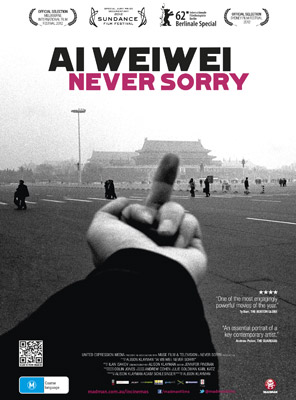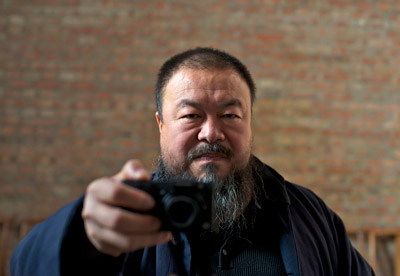Ai Weiwei Never Sorry Interview

Ai Weiwei Never Sorry Interview
Cast: Ai Weiwei, Danqing Chen, Ying GaoDirector: Alison Klayman
Genre: Documentary
Rated: M
Running Time: 91 minutes
Synopsis: Ai Weiwei is at once China's most celebrated contemporary artist and its most vocal domestic critic. Born into China's revolutionary intelligentsia, Ai's biography often parallels the course of modern Chinese history. In 2008, his denunciation of the Olympic Games shifted his position to political detractor. His investigation into collapsed schools and the deaths of more than 5,000 schoolchildren following the May 2008 Sichuan earthquake gave rise to Ai's most public conflict with the Chinese government to date.
The film begins in December 2008 when Ai initiates his Sichuan investigation and falls under increasing government scrutiny. Surveillance escalates to a late night police raid in August 2009 during which Ai is assaulted. One month later, Ai undergoes emergency brain surgery in Munich while installing his first major solo exhibition in the West. This tangible evidence of police brutality is juxtaposed with his moving installation "Remembering," made of 9,000 backpacks to memorialise schoolchildren killed in the quake.
Ai's personal and public search for justice leads him to multiple trips to Sichuan's capital Chengdu to file a brutality complaint against the local police and to investigate the schoolchildren's deaths. Throughout, Ai is trailed and monitored by plainclothes officers. Concurrently, Ai's artistic career on a meteoric rise, and he gets a prestigious commission to fill the Turbine Hall at London's Tate Modern with a new work.
Ai is also on a personal journey, and the film captures never-before recorded interviews with his mother and brother. They discuss the legacy of Ai's father, Ai Qing, China's foremost modern poet, and Ai's youth spent in China's remote Xinjiang province as punishment for his father's alleged political transgressions.
Friends recount the bohemian decade he spent in 1980s New York City, and his mid-'90s return to Beijing where he invigorated the burgeoning avant-garde scene. In present-day China, Ai's family fears for his safety. His mother wishes he would focus on art. He is also a first-time father, at age 52, to a son Ai Lao who is the product of an extramarital affair. Ai Lao's mother hopes Ai will continue to play a significant role in her son's life.
Nonetheless, Ai continues to challenge the government and to produce art. In 2010, Ai realises his most ambitious project to date when he pours 100 million hand-made porcelain sunflower seeds into Tate Modern. The seeds symbolise the sum of his past efforts and the power of mass connection and mass participation. The film climaxes with Ai surrounded by his hopes for the future: his son and 100 million symbols of collaboration and creativity.
Soon after, China strikes back with devastating force. Against the backdrop of a nation-wide crackdown on dissent in early 2011, Ai witnesses the shocking demolition of his Shanghai studio and the unlawful 81-day detention of the artist himself. These dramatic events make Ai a bigger symbol now than ever, and as the film closes his defiant spirit faces its greatest challenge yet: how to navigate the strict conditions of his release.
Release Date: September 20th, 2012
Director's Statement by Alison Klayman
The reason I wanted to make a film about Ai Weiwei was because I wanted to make a movie about a creative and principled artist, willing to make calculated risks to push society to grapple with its own shortcomings. He is a charismatic figure who in his personal dynamism embodies the multitude of experiences and realities in China, a sign of how China has changed and how there is more change to come. Which is why a lot went through my mind last April when, after over two years of filming and several months into the edit, Weiwei disappeared into police custody without any formal charges or indication when he would be released.
For weeks I stayed up late into the night in New York, so that I could be awake as morning came to Beijing. Media requests were constant. I monitored every development, keeping Skype signed on near my bed when I slept, and was rarely far from a Twitter feed. Ai's 81-day detention amplified his story symbolically and in the press. His release made news around the world, and people who may never have consciously heard his name suddenly became familiar with his face and his cause. Ai Weiwei: Never Sorry brings the man and his history into the focus.
I started filming Weiwei in 2008, just after his work on the Bird's Nest Olympic stadium and his subsequent denunciation of the Games as Party propaganda made him an international figure for the first time. The years since have been even more transformational. Having never used a computer before 2005, Weiwei began a blog remarkable for its frank and politically incendiary opinions. The government shut his blog down in 2009, but by then, he had already established himself as an online icon-a role he continues to play through Twitter. That same year, Weiwei opened his largest solo museum exhibition in Munich, and, after a lifetime of vowing he didn't want children, he also became a father. Of course, there was his arrest in 2011 to cap everything off. These years are a pinnacle for a man who already experienced several significant epochs in his life. I want to give people a chance to spend time with Weiwei, listen to his voice and his opinions, see his flaws, and experience the conditions of his life. The idea is to allow audiences to evaluate Weiwei's choices and, I hope, to be inspired by his courage and humanity. But Never Sorry is not just about Weiwei, or China. I hope the film will move audiences to interrogate themselves. What is my vision for a better future? What would I risk to express myself? The most powerful impact this film can have is inspiring a new crop of outspoken artists, activists and citizens, with a strong vision for improving the future in their respective societies.

Interview with Ai Weiwei
Question: What would you like people to do after seeing the film?Ai Weiwei: I think (by seeing the film) the audience will first have some knowledge about who I am and what kind of issues I am always concerned about as an artist. I think they should really think that freedom of expression is very valuable, and they should treasure this right. In many areas and locations around the world, you can completely lose your freedom simply because you are asking for freedom. You even never have a chance to speak out.
In many developed societies people take freedom of expression for granted, but at the same time it would be a crime to be ignorant of the efforts that other people make for this right. Humans share all values as a common property. You cannot pretend you don't know it, and you can't say it has nothing to do with me. That would only make you as a very selfish person and very shortsighted. What made me a recognisable figure is only because I do have an issue, and also because I successfully use the Internet, to a degree. I can communicate more freely through the Internet and media to carry out the message, so this is very important- you have the message and you have a way to carry it out. I hope people watching this they also can realise that, I think today we are living in a very different world and today we do have new possibilities, and we can make the world into a better place for everybody.
Question: How did it feel to be the subject of a film at Sundance, where the film received its world premiere, and be unable to attend?
Ai Weiwei: This film is about freedom of expression. The fact that I could not be part of this festival becomes the strongest argument for the need for the film. It gives a strong argument about why this kind of documentary is important, why the voice needs to be protected, and why my efforts, along with those of Alison and other documentary filmmakers, to protect freedom of expression and basic human rights, are very valuable.
Question: How does the documentary make China look?
Ai Weiwei: The documentary is about reality, it's about the reality that has been existing in this piece of land for decades. China is developing itself, but in certain cases such as the judicial system and freedom of speech, it has hardly developed. It's still under very strong control. But I think China cannot afford not to change. It takes time, but only when there's pressure, when there's a demand for it. We all know humans are not going to change by themselves if there's no pressure there.
Question: What would Chinese audiences think of the film?
Ai Weiwei: I don't think it will ever be seen by the public in mainland China, only a small public will ever see it in China. Only on YouTube or online, which is just a few people, less than 0.1 percent who technically can jump over the Great Firewall and watch it. But still that's very important, the effort is important only because it's so difficult.
I think it's good for anybody to see it, the government and officials and police should see it. They should understand…they should face the reality, and to understand what is in the struggle. Otherwise they have no way to evaluate themselves. Because they think all Western people hate China or are trying to overthrow the government, but they don't really look at each individual case to see what the intention is and how to make it better.
I think this film will help make it better. I think this is very important to let people understand the situation.
MORE
- Emma Stone Magic in the Moonlight
- Jessica De Gouw Cut Snake
- Maxine Peake Funny Cow
- Denzel The Equalizer 2
- Johnny Flynn Beast
- Logan Marshall Green Upgrade
- Shailene Woodley Adrift
- Eric Toledano and Olivier Nakache C'est La Vie...
- André Leon Talley The Gospel According To André...
- Shakespeare In Tokyo
- Mission: Impossible Fallout
- Glenn Close The Wife
- Allison Chhorn Stanley's Mouth Interview
- Benicio Del Toro Sicario: Day of the Soldado
- Dame Judi Dench Tea With The Dames
- Sandra Bullock Ocean's 8
- Chris Pratt Jurassic World: Fallen Kingdom
- Claudia Sangiorgi Dalimore and Michelle Grace...
- Rachel McAdams Disobedience Interview
- Sebastián Lelio and Alessandro Nivola...
- Perri Cummings Trench Interview
Copyright © 2001 - Female.com.au, a Trillion.com Company - All rights reserved. 6-8 East Concourse, Beaumaris, Vic 3193, Australia.



